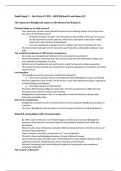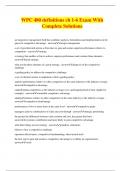Summary
Summary The crisis of , Richard II and Henry IV, England
- Institution
- PEARSON (PEARSON)
This document provides a full summary of the chapter of the crisis of , Richard II and Henry IV. This is the breadth topic in Lancastrians and Yorkists option 30 Edexcel A level history. I used these notes in my mocks to get an A* predicted and have a place at Oxford for history
[Show more]




